Gillian Welch | |
|---|---|
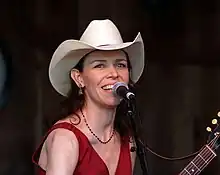 Welch performing at MerleFest in 2006 | |
| Background information | |
| Birth name | Gillian Howard Welch |
| Born | October 2, 1967 New York City, U.S. |
| Origin | Nashville, Tennessee |
| Genres | |
| Occupation(s) | Singer-songwriter |
| Instrument(s) |
|
| Years active | 1996–present |
| Labels |
|
| Website | gillianwelch.com |
Gillian Howard Welch (/ˈɡɪliən ˈwɛltʃ/; born October 2, 1967) is an American singer-songwriter. She performs with her musical partner, guitarist David Rawlings. Their sparse and dark musical style, which combines elements of Appalachian music, bluegrass, country and Americana, is described by The New Yorker as "at once innovative and obliquely reminiscent of past rural forms."[1]
Welch and Rawlings have collaborated on nine critically acclaimed albums, five released under her name, three released under Rawlings' name, and one under both of their names. Her 1996 debut, Revival, and the 2001 release Time (The Revelator), received nominations for the Grammy Award for Best Contemporary Folk Album. Her 2003 album, Soul Journey, introduced electric guitar, drums, and a more upbeat sound to their body of work. After a gap of eight years, she released a fifth studio album, The Harrow & the Harvest, in 2011, which was also nominated for a Grammy for Best Contemporary Folk Album. In 2020, Welch and Rawlings released All the Good Times (Are Past & Gone), which won the 2021 Grammy Award for Best Folk Album.[2]
Welch was an associate producer and performed on two songs of the soundtrack of the Coen brothers 2000 film O Brother, Where Art Thou?, a platinum album that won the Grammy Award for Album of the Year in 2002. She also appeared in the film attempting to buy a Soggy Bottom Boys record. Welch, while not one of the principal actors, did sing and provide additional lyrics to the Sirens song "Didn't Leave Nobody but the Baby." In 2018 she and Rawlings wrote the song "When a Cowboy Trades His Spurs for Wings" for the Coens' The Ballad of Buster Scruggs, for which they received a nomination for the Academy Award for Best Original Song. Welch has collaborated and recorded with Alison Krauss, Ryan Adams, Jay Farrar, Emmylou Harris, Mark Knopfler, the Decemberists, Sam Phillips, Conor Oberst, Ani DiFranco, Robyn Hitchcock, Barry Gibb and Molly Tuttle.
Early life
Welch was born on October 2, 1967, in New York City, and was adopted by Mitzie Welch (née Marilyn Cottle)[3][4] and Ken Welch, comedy and music entertainers.[1] Her biological mother was a freshman in college, and her father was a musician visiting New York City.[1][5][6] Welch has speculated that her biological father could have been one of her favorite musicians, and she later discovered from her adoptive parents that he was a drummer.[1][5][6] Alec Wilkinson of The New Yorker stated that "from an address they had been given, it appeared that her mother ... may have grown up in the mountains of North Carolina".[1] When Welch was three, her adoptive parents moved to Los Angeles to write music for The Carol Burnett Show. They also appeared on The Tonight Show.[1]
As a child, Welch was introduced to the music of American folk singers Bob Dylan, Woody Guthrie, and the Carter Family. She performed folk songs with her peers at the Westland Elementary School in Los Angeles.[1][7] Welch later attended Crossroads School, a high school in Santa Monica, California. While in high school, a local television program featured her as a student who "excelled at everything she did."[1]
While a student at the University of California, Santa Cruz, Welch played bass in a goth band, and drums in a psychedelic surf band.[1] In college, a roommate played an album by the bluegrass band The Stanley Brothers, and she had an epiphany:
The first song came on and I just stood up and I kind of walked into the other room as if I was in a tractor beam and stood there in front of the stereo. It was just as powerful as the electric stuff, and it was songs I'd grown up singing. All of a sudden I'd found my music.[8]
After graduating from UC Santa Cruz with a degree in photography, Welch attended the Berklee College of Music in Boston, where she majored in songwriting.[9] During her two years studying at Berklee, Welch gained confidence as a performer.[1][9] Welch met her music partner David Rawlings at a successful audition for Berklee's only country band.[10][11]
Career
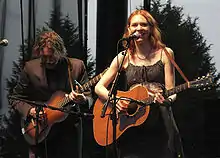
Upon finishing college in 1992, Welch moved to Nashville, Tennessee.[12] She recalled, "I looked at my record collection and saw that all the music I loved had been made in Nashville—Bill Monroe, Dylan, the Stanley Brothers, Neil Young—so I moved there. Not ever thinking I was thirty years too late."[1] Rawlings soon followed. In Nashville, after singing "Long Black Veil," the two first realized that their voices harmonized well and they started to perform as a duo.[1] They never considered using a working name, so the duo were simply billed as "Gillian Welch."[1] A year after moving to Nashville, Welch found a manager, Denise Stiff, who already managed Alison Krauss. Both Welch and Stiff ignored frequent advice that Welch should stop playing with Rawlings and join a band.[1][7] They eventually signed a recording contract with Almo Sounds.[7] Following a performance opening for Peter Rowan at the Station Inn, producer T-Bone Burnett expressed interest in recording an album. Burnett did not plan to disturb Welch's and Rawlings' preference for minimal instrumentation, and Welch agreed to take him on as a producer.[13]
Revival
For the recording sessions of Welch's debut, Revival, Burnett wanted to recapture the bare sound of Welch's live performance.[13] Welch recalled, "That first week was really intense. It was just T-Bone, the engineer, and Dave and myself. We got so inside our little world. There was very little distance between our singing and playing. The sound was very immediate. It was so light and small."[13] Later, they recorded several more songs and played with an expanded group of musicians; guitarist and Rock and Roll Hall of Fame inductee James Burton, bassist Roy Huskey, Jr., and veteran session drummers Jim Keltner, and Buddy Harman.[13]
The album was released in April 1996 to mostly positive reviews. Mark Deming of Allmusic called it a "superb debut" and wrote, "Welch's debts to artists of the past are obvious and clearly acknowledged, but there's a maturity, intelligence, and keen eye for detail in her songs you wouldn't expect from someone simply trying to ape the Carter Family."[14] Bill Friskics-Warren of No Depression praised the album as "breathtakingly austere evocations of rural culture."[13] The Arlington Heights, Illinois Daily Herald's Mark Guarino observed that Revival was "cheered and scrutinized as a staunch revivalist of Depression-era music only because her originals sounded so much like that era." He attributed this to the biblical imagery of the lyrics, Burnett's threadbare production, and the plainly-sung bleakness in Welch's vocals.[15] Ann Powers of Rolling Stone gave Revival a lukewarm review and criticized Welch for not singing of her own experiences, and "manufacturing emotion."[16] Robert Christgau echoed Powers: Welch "just doesn't have the voice, eye, or way with words to bring her simulation off."[17]
The song, "Orphan Girl," from Revival has been covered by Emmylou Harris, Ann Wilson, Karin Bergquist of Over the Rhine, Mindy Smith, Patty Griffin, Linda Ronstadt, Tim & Mollie O'Brien and Holly Williams.
Others who have recorded Welch's songs include Joan Baez, Grace Porter, Courtney Barnett and Kurt Vile, Punch Brothers, Mike Gordon, Bright Eyes, Calexico, Ani DiFranco, The Decemberists, Karl Blau and Jim James.
Revival was nominated for the 1997 Grammy Award for Best Contemporary Folk Album, but lost to Bruce Springsteen's The Ghost of Tom Joad.[18]
Hell Among the Yearlings
The duo's 1998 Hell Among the Yearlings continued the rustic and dark themes; the songs' subject matter varies from a female character killing a rapist, a mining accident, a murder ballad, and an ode to morphine before death.[19] Like Revival, Hell Among The Yearlings featured a sparse style that focused on Rawlings and Welch's voices and guitars.[19][20]
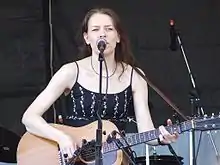
The album also received favorable reviews. Robert Wilonsky of the Dallas Observer observed that Welch "inhabits a role so completely, the fiction separating character and audience disappears".[21] Thom Owens (Allmusic) stated that the album "lacks some of the focus" of Revival, but is "a thoroughly satisfying second album" and proof that her debut was not a fluke.[22] No Depression's Farnum Brown commended the live and "immediate feel" of the album, Welch's clawhammer banjo,[23] and Rawlings' harmonies.[18] Similar to Revival, Welch was praised for reflecting influences such as the Stanley Brothers, but still managing to create an original sound,[20] while Chris Herrington from Minneapolis's City Pages criticized the songs' lack of authenticity. He wrote "Welch doesn't write folk songs; she writes folk songs about writing folk songs."[24]
O Brother, Where Art Thou?

Welch sang two songs and served as the associate producer for the Burnett-produced soundtrack to the 2000 film of the same name.[25] She shared vocals with Alison Krauss on a rendition of the gospel song "I'll Fly Away." Dave McKenna of The Washington Post praised their version: the singers "soar together."[26] Burnett and Welch wrote additional lyrics for the song "Didn't Leave Nobody but the Baby," sung by Welch, Emmylou Harris, and Krauss. The song is an elaboration of an old Mississippi tune discovered by Alan Lomax, and was nominated for the 2002 Grammy Award for Best Country Collaboration with Vocals.[27] The platinum album won the 2002 Grammy Award for Album of the Year. The surprise success of the soundtrack gave Welch a career boost.[28][29] Welch also made a cameo appearance in the film.[30]
Time (The Revelator)
When Universal Music Group purchased Almo Sounds, Welch began her own independent label, Acony Records (named for the Appalachian wildflower, Acony Bell, subject of the song of that name on Revival).[7][15] Rawlings produced the first release on Welch's new label, the 2001 album Time (The Revelator).[15][31] All but one song on the album was recorded in the historic RCA Studio B in Nashville.[32] "I Want To Sing That Rock and Roll" was recorded live at the Ryman Auditorium in the recording sessions for the concert film Down from the Mountain.
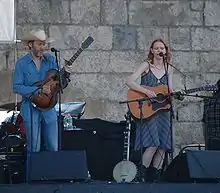
Welch has said the album is about American history, rock 'n' roll, and country music.[33] There are songs about the assassination of Abraham Lincoln, the Titanic Disaster, John Henry, and Elvis Presley.[32] Time continues Welch and Rawlings' style of mellow and sparse arrangements. Welch explained, "As opposed to being little tiny folk songs or traditional songs, they're really tiny rock songs. They're just performed in this acoustic setting. In our heads we went electric without changing instruments."[34]
Time (The Revelator) received extensive critical praise, most of which focused on the evolution of lyrics from mountain ballads.[25][34][35] For Michael Shannon Friedman of The Charleston Gazette, "Welch's soul-piercing, backwoods quaver has always been a treasure, but on this record her songwriting is absolutely stunning."[35] Critics compare the last track, the 15-minute "I Dream a Highway", to classics by Bob Dylan and Neil Young. Zac Johnson of Allmusic described I Dream ... as akin to "sweetly dozing in the [river] current like Huck and Jim's Mississippi River afternoons".[34][35] No Depression's Grant Alden wrote, "Welch and Rawlings have gathered ... fragments from across the rich history of American music and reset them as small, subtle jewels adorning their own keenly observed, carefully constructed language."[25] Time finished thirteenth in the 2001 Village Voice Pazz & Jop music critic poll.[36] Time (The Revelator) appeared in best of decade lists of Rolling Stone, Paste, Uncut, The Irish Times, and the Ottawa Citizen.[31][37][38][39][40] The album was nominated for the 2002 Grammy Award for Best Contemporary Folk Album, but lost to Bob Dylan's Love and Theft.[41] Time peaked at No. 7 on the Billboard Independent Album chart.[42]
The Revelator Collection DVD was released in 2002. It featured live performances and music videos of songs from Time, and some covers. The concert footage was filmed in 2001, and the music videos included Welch and Rawlings performing three songs at RCA Studio B. No Depression's Barry Mazor praised the DVD as an accompaniment for Time, calling it "one last exclamation point on that memorable and important project."[43]
Soul Journey
For the 2003 release, Soul Journey, Welch and Rawlings explored new territory. Welch said: "I wanted to make it a happier record. Out of our four records, I thought this might be the one where you're driving down the road listening to it on a sunny summer day."[44] Rawlings again produced the record. The album also reflected a change in the typically sparse instrumentation: Welch and Rawlings introduced a dobro, violin, electric bass and drums, and Welch later said, "Everything's not supposed to sound the same, you want it to reflect change and growth."[10]

In three songs of Soul Journey, for the first time Welch and Rawlings recorded their own versions of traditional folk songs.[45]
Soul Journey also garnered significant acclaim. John Harris of Mojo magazine described the album as "pretty much perfect", and Uncut's Barney Hoskyns favorably compared it to Bob Dylan and The Band's The Basement Tapes.[46][47] Will Hermes of Entertainment Weekly wrote that Welch has "never sounded deeper, realer, or sexier."[48] Soul Journey peaked at No. 107 on the Billboard charts, and reached No. 3 for Independent Albums.[49]
David Rawlings Projects
In addition to their work released under the name “Gillian Welch,” Welch and Rawlings have continued to build upon their partnership with several releases under Rawlings’ name. The Rawlings releases generally feature a larger string band and more lush arrangements than their “Gillian Welch” material, and have usually been released under the band name Dave Rawlings Machine. Andy Gill of The Independent described the band’s 2009 debut album A Friend of a Friend as "akin to one of Welch's albums, but with the balance of their harmonies swapped to favour Rawlings' voice".[50] Welch co-wrote five of the songs with Rawlings, and provided guitar and harmony vocals.[51][52] Although ostensibly Rawlings' first solo album, Alex Ramon of PopMatters noted the similarities to Welch albums.[52] Paste Magazine's Stephen Deusner praised A Friend of a Friend for incorporating "a wide swath of traditional American music," comments echoed by Rolling Stone's Will Hermes and in the PopMatters piece.[52][53][54]
On September 18, 2015, the duo released their second album under the band title Dave Rawlings Machine, Nashville Obsolete. The band includes Willie Watson, Paul Kowert, Brittany Haas, and occasionally includes Jordan Tice.
Released on August 11, 2017, Poor David’s Almanack was the first Welch/Rawlings collaboration to be released under the name David Rawlings, dropping the previous Dave Rawlings Machine moniker. The song “Cumberland Gap,” which features on the album, was nominated for the 2018 Grammy Award for Best American Roots Song. It was also utilized in the opening sequence of the 2019 Guy Richie film, The Gentlemen.[55]
The Harrow & the Harvest
In a 2007 feature in The Guardian, critic John Harris expressed frustration that there had not been a Gillian Welch release in four years.[56] Creation Records founder Alan McGee showed optimism about Welch and Rawlings testing out some new songs while opening some concerts for Rilo Kiley, and wrote in a 2009 blog entry "the long gestation period signals nothing less than a perfect album".[57] In 2009, Rawlings said that recording for the next Gillian Welch album has started, but did not give a release date.[58]
The Harrow & the Harvest was released on June 28, 2011.[59] Welch attributed the long time period between releases to dissatisfaction with the songs they were writing.[60] She explained: "Our songcraft slipped and I really don't know why. It's not uncommon. It's something that happens to writers. It's the deepest frustration we have come through, hence the album title."[60] The writing process involved "this endless back and forth between the two of us," Welch said, stating that "It's our most intertwined, co-authored, jointly-composed album."[61]
The album received praise from publications such as The Los Angeles Times, Uncut, and Rolling Stone.[62][63][64] Thom Jurek of Allmusic wrote that the album "is stunning for its intimacy, its lack of studio artifice, its warmth and its timeless, if hard won, songcraft".[65]
The album peaked at No. 20 on the US Billboard 200 and No. 25 on the UK Albums Chart.[66][67] It was nominated for a Grammy for Best Contemporary Folk Album, as well as Best Engineered Album.[68]
Boots No 1: The Official Revival Bootleg
Boots No 1: The Official Revival Bootleg, was released on November 25, 2016. It received the status of 'universal acclaim', receiving a Metascore of 79, based upon eight critic reviews of the album. The album celebrates the 20th anniversary of Welch's debut album, Revival, and includes outtakes, alternate versions, and demos of the songs featured on the original, as well as eight new unreleased tracks.
All the Good Times (Are Past & Gone)
In July 2020, Welch and Rawlings announced All the Good Times (Are Past & Gone), an album of covers and traditional songs recorded at their home during the COVID-19 lockdowns of 2020.[69] All the Good Times is notably the first album in their decades-long history of collaboration to be released jointly in both of their names.[70] The album won the 2021 Grammy Award for Best Folk Album.[2]
Musical style
Welch and Rawlings incorporate elements of early twentieth century music such as old time, classic country, gospel and traditional bluegrass with modern elements of rhythm and blues, rock 'n' roll, jazz, and punk rock.[1] The New Yorker's Alec Wilkinson maintained their musical style is "not easily classified—it is at once innovative and obliquely reminiscent of past rural forms".[1]
The instrumentation on their songs is usually a simple arrangement, with Welch and Rawlings accompanying their own vocals with acoustic guitars, banjos, or a mandolin.[1] Welch plays rhythm guitar with a 1956 Gibson J-50 (or banjo), while Rawlings plays lead on a 1935 Epiphone Olympic Guitar.[71] The New Yorker's Wilkinson described Rawlings as a "strikingly inventive guitarist" who plays solos that are "daring melodic leaps".[1] A review in No Depression by Andy Moore observed that Rawlings "squeezes, strokes, chokes and does just about everything but blow into" his guitar.[72]
Themes
Many songs performed by Welch and Rawlings contain dark themes about social outcasts struggling against such elements as poverty, drug addiction, death, a disconnection from their family, and an unresponsive God.[1] Despite Welch being the lead singer, several of these characters are male.[1] Welch has commented, "To be commercial, everybody wants happy love songs. People would flat-out ask me, 'Don't you have any happy love songs?' Well, as a matter of fact, I don't. I've got songs about orphans and morphine addicts."[12] To reflect these themes, Welch and Rawlings often employ a slow pace to their songs. Their tempo is compared to a "slow heartbeat", and Cowperthwait of Rolling Stone observed that their songs "can lull you into near-hypnosis and then make your jaw drop with one final revelation".[1][73]
Reception

Geoffrey Himes of The Washington Post described Welch as "one of the most interesting singer-songwriters of her generation".[74] In 2003, Tom Kielty of The Boston Globe observed that she was "quietly establishing one of the most impressive catalogs in contemporary roots music", and a 2007 piece in The Guardian by John Harris called Welch "one of the decade's greatest talents".[56][75] Critic Robert Hilburn of the Los Angeles Times wrote, "At every turn, she demonstrates a spark and commitment that should endear her to anyone from country and folk to pop and rock fans who appreciate imagination and heart."[76]
When Welch's first two albums came out, critics questioned the authenticity of her music, as she was raised in Southern California, but performed Appalachian themed songs.[11][20][77] For Revival, Welch was criticized for "manufacturing emotion", and a review of Hell Among the Yearlings by Chris Herrington of City Pages stated, "Welch is someone who discovered old-time music in college and decided that her own sheltered life could never be worth writing about", and that she is "completely devoid of individuality".[16][24] Other critics rejected the notion that her background affects the authenticity of her music. Music critic Mark Kemp defended Welch in a New York Times piece:
The first-person protagonist of Ms. Welch's song ("Caleb Meyer") may be a young girl from a time and place that Ms. Welch will never fully understand, but the feelings the singer expresses about rape, and the respect she displays for her chosen musical genre, are nothing if not poignantly authentic. Likewise, it matters not whether Ms. Welch has ever walked the streets of "the black dust towns of East Tennessee" about which she sings in "Miner's Refrain" because the sense of foreboding that she expresses for the men who once labored in coal mines with futile hopes of a better life comes through loud and clear.[78]
The Wall Street Journal's Taylor Holliday echoed this: "Stingy critics give Ms. Welch a hard time because she's a California city girl, not an Appalachian coal miner's daughter. But as Lucinda or Emmylou might attest, love of the music is not a birthright, but an earned right. Listen to Ms. Welch yodel, in a tune about that no-good "gal" Morphine, and you know she's as mountain as they come."[20]
On September 16, 2015, the duo was awarded the Lifetime Achievement Award for Songwriting by the Americana Music Association.
Influences and collaborations
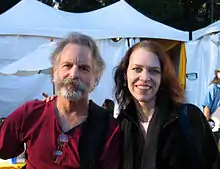
... it wasn't until I became friends with Dave and Gil, about ten years ago, that I had people who understood songwriting and could express it to me in a way that left out the guesswork.[79]
—Ketch Secor, Old Crow Medicine Show
Welch emphasizes music from a previous era as her major influence. She said that "by and large I listen to people who are dead. I'm really of the tried-and-true school. I let 50 years go by and see what's really relevant."[77] Welch has acknowledged inspiration from several traditional country artists, including the Stanley Brothers, the Carter Family, the Louvin Brothers, and the Blue Sky Boys.[1][80] She explained her relationship with traditional music by saying, "I've never tried to be traditional. It's been a springboard for me and I love it and revere it and would not be doing what I do without the music of the Monroe Brothers, the Stanley Brothers and the Carter Family. However, it was clear I was never going to be able to do exactly that; I'm a songwriter."[81]
In addition to the strong country influence, Welch also draws on a repertoire of such rock 'n' roll artists as Bob Dylan, Chuck Berry, Neil Young, the Grateful Dead and the Velvet Underground.[1][11][82] She has noted alternative rock bands Throwing Muses, Pixies and Camper Van Beethoven "don't directly inform my music, but they're in there."[77][82] Her cover of Black Star by Radiohead became well-known and was released as a single in 2005.
Welch has recorded songs with a variety of notable artists, including Ryan Adams, Ani DiFranco, Emmylou Harris, Jay Farrar, Alison Krauss, Old Crow Medicine Show, Bright Eyes, Robyn Hitchcock, Steve Earle, Ralph Stanley, Sara Watkins, The Decemberists, Solomon Burke and Mark Knopfler.[10][11][53][83][84] Welch and Rawlings' contributions on Hitchcock's album Spooked was described by Christopher Bahn of The A.V. Club as "subtle but vital".[85] She later created the cover art for Hitchcock's 2014 album The Man Upstairs.[86] Mark Deming of Allmusic wrote that their work on Ryan Adams' album Heartbreaker "brought out the best in Adams".[87][88]
Artists who have recorded songs written by Welch include Jimmy Buffett, Alison Krauss and Union Station, Trisha Yearwood, Joan Baez, Brad Mehldau & Chris Thile, Allison Moorer, Emmylou Harris, Miranda Lambert, Madison Cunningham, Kathy Mattea and ZZ Top.[1][10][89][90][91][92]
Performances

Welch and Rawlings have played many music festivals, including The Newport Folk Festival, Coachella Festival, The Telluride Bluegrass Festival, The Cambridge Folk Festival, Bonnaroo, MerleFest, The Austin City Limits Festival, and Farm Aid.[11][81][93][94][95][96][97][98][99] They have toured North America extensively, and have played in Europe, Australia, and New Zealand.[11][23][81][100] Concert reviews have praised the chemistry between Welch and Rawlings on stage.[10][100][101] Tizzy Asher of the Seattle Post-Intelligencer wrote "there was a startling unspoken intimacy between them. They anticipated each other's movements and shifted when necessary to fit each other."[101] On August 6, 2022, they performed on the Grand Ole Opry.[102]
The Dave Rawlings Machine have toured North America, with the band originally composed of Rawlings, Welch and three members of Old Crow Medicine Show.[103] The band is currently composed of Rawlings, Welch, Wilie Watson, Paul Kowert, and Brittany Haas. Welch and Rawlings also participate in group tours with notable musicians. In 2004, they were part of the Sweet Harmony Traveling Revue, a three-week US tour with Patty Griffin, Buddy Miller and Emmylou Harris.[104] In 2009, The Dave Rawlings Machine joined Old Crow Medicine Show, the Felice Brothers and Justin Townes Earle for the Big Surprise Tour, a US tour described as a "roots-music extravaganza".[105] In 2011, Welch was a support act for Buffalo Springfield, who reformed and toured that year.[106]
Discography
- Revival (1996)
- Hell Among the Yearlings (1998)
- Time (The Revelator) (2001)
- Soul Journey (2003)
- The Harrow & the Harvest (2011)
- All the Good Times (Are Past & Gone) (w/David Rawlings) (2020)
Awards and nominations
| Year | Association | Category | Nominated Work | Result |
|---|---|---|---|---|
| 1997 | Grammy Awards | Best Contemporary Folk Album | Revival | Nominated |
| 2001 | International Bluegrass Music Awards | Gospel Recorded Performance of the Year | "I'll Fly Away" (with Alison Krauss) | Won |
| Recorded Event of the Year | Clinch Mountain Sweethearts (with Ralph Stanley and various artists) | Won | ||
| Album of the Year | O Brother, Where Art Thou? (with various artists) | Won | ||
| Academy of Country Music Awards | Won | |||
| Country Music Association Awards | Won | |||
| Vocal Event of the Year | "Didn't Leave Nobody But The Baby" (with Alison Krauss and Emmylou Harris) | Nominated | ||
| "I'll Fly Away" (with Alison Krauss) | Nominated | |||
| 2002 | Grammy Awards | Album of the Year | O Brother, Where Art Thou? (with various artists) | Won |
| Best Country Collaboration with Vocals | "Didn't Leave Nobody But The Baby" (with Alison Krauss and Emmylou Harris) | Nominated | ||
| Best Contemporary Folk Album | Time (The Revelator) | Nominated | ||
| Americana Music Honors & Awards | Album of the Year | Nominated | ||
| Song of the Year | "I Want To Sing That Rock & Roll" (with David Rawlings) | Nominated | ||
| Artist of the Year | Gillian Welch and David Rawlings | Nominated | ||
| International Bluegrass Music Awards | Album of the Year | Down from the Mountain (with various artists) | Won | |
| 2012 | Americana Music Honors & Awards | Artist of the Year | Gillian Welch | Won |
| Grammy Awards | Best Folk Album | The Harrow & the Harvest (with David Rawlings) | Nominated | |
| 2015 | Americana Music Honors & Awards | Lifetime Achievement Award for Songwriting | Gillian Welch and David Rawlings | Won |
| 2018 | Grammy Awards | Best American Roots Song | "Cumberland Gap" (with David Rawlings) | Nominated
Thomas Wolfe Prize [107] won |
| 2019 | Academy Awards | Best Original Song | "When a Cowboy Trades His Spurs for Wings" (with David Rawlings) | Nominated |
| 2021 | Grammy Awards | Best Folk Album | All the Good Times (Are Past & Gone) (with David Rawlings) | Won |
Footnotes
References
- 1 2 3 4 5 6 7 8 9 10 11 12 13 14 15 16 17 18 19 20 21 22 23 24 Wilkinson, Alec (September 20, 2004). "The Ghostly Ones". The New Yorker. Retrieved February 2, 2016.
- 1 2 Hussey, Allison (March 14, 2021). "Gillian Welch and David Rawlings Win Best Folk Album at 2021 Grammys". Pitchfork. Retrieved December 28, 2021.
- ↑ "Marilyn Welch". Discogs.
- ↑ "Marilyn Welch Obituary (2014) - Los Angeles, CA - Los Angeles Times". Legacy.com.
- 1 2 Harris, John (June 3, 2003). "USA today". The Guardian. London. Retrieved January 7, 2010.
- 1 2 Haiken, Melanie (July 23, 2003). "The Orphan Girl Opens Up". Paste Magazine. Archived from the original on January 6, 2009. Retrieved January 7, 2010.
- 1 2 3 4 Lewis, Randy (September 30, 2004). "Where the soul leads". Los Angeles Times. Retrieved January 7, 2010.
- ↑ Simmons, Sylvie (September 25, 2005). "Hillbilly Millionaire". San Francisco Chronicle. Retrieved January 7, 2010.
- 1 2 Alden, Grant; Peter Blackstock (2005). Grant Alden, Peter Blackstock (ed.). The Best of No Depression: Writing about American Music. University of Texas Press. p. 219. ISBN 0-292-70989-7. Retrieved January 17, 2010.
- 1 2 3 4 5 Reed, James (November 7, 2003). "Gillian Welch thrives in an old-time niche". The Boston Globe. Retrieved January 12, 2010.
- 1 2 3 4 5 6 Best, Sophie (November 5, 2004). "Beverly hillbilly". The Age. Retrieved January 15, 2010.
- 1 2 Sexton, Paul (February 1, 2003). "Another Country". The Times.
- 1 2 3 4 5 Friskics-Warren, Bill (Summer 1996). "Orphan Girl of the Hollywood hills finds a high lonesome musical home in the heart of the Appalachians". No Depression. Archived from the original on July 19, 2009. Retrieved January 8, 2010.
- ↑ Deming, Mark. "Revival: Overview". Allmusic. Retrieved January 9, 2010.
- 1 2 3 Guarino, Mark (September 12, 2003). "Soul Journeying: Gillian Welch steps back in moving ahead". Chicago Daily Herald. Retrieved January 9, 2010.
- 1 2 Powers, Ann. "Gillian Welch". Rolling Stone. Retrieved January 14, 2010.
- ↑ Christgau, Robert. "Gillian Welch". robertchristgau.com. Retrieved January 9, 2010.
- 1 2 Brown, Farnum. "Hell Among The Yearlings". No Depression. Archived from the original on January 13, 2010. Retrieved January 11, 2010.
- 1 2 Santelli, Robert (August 12, 1998). "Gillian Welch: Hell Among The Yearlings". Rolling Stone. Archived from the original on May 18, 2007. Retrieved January 9, 2010.
- 1 2 3 4 Holliday, Taylor (August 21, 1998). "The Divas of Credible Country—There's more to Nashville than meets the ears of radio listeners". Wall Street Journal. Retrieved January 12, 2010.
- ↑ Wilonsky, Robert (July 23, 1998). "Out There". The Dallas Observer. Retrieved January 11, 2010.
- ↑ Owens, Thom. "Hell Among the Yearlings: Overview". Allmusic. Retrieved January 9, 2010.
- 1 2 Wilson, MacKenzie (August 7, 2001). "liveDaily Interview: Singer-songwriter Gillian Welch". LiveDaily. Archived from the original on March 9, 2005. Retrieved January 15, 2010.
- 1 2 Herrington, Chris (July 29, 1998). "Gillian Welch: Hell Among the Yearlings". City Pages. Archived from the original on February 26, 2010. Retrieved January 9, 2010.
- 1 2 3 Alden, Grant (September–October 2001). "Quicksilver Girl". No Depression. Archived from the original on January 14, 2010. Retrieved January 10, 2010.
- ↑ McKenna, Dave (December 24, 2000). "'O Brother': This One's a Keeper". The Washington Post. Retrieved February 12, 2010.
- ↑ Orr, Jay (January 7, 2002). "O Brother, Williams Tribute Corner Country Grammy Nods". CMT.com. Retrieved January 11, 2010.
- ↑ Appleford, Steve (May 16, 2003). "Settling nicely into her skin". Los Angeles Times. Retrieved January 10, 2010.
- ↑ Curtis, Kim (November 6, 2003). "The duet known as Gillian Welch". Today.com. Associated Press. Retrieved January 10, 2010.
- ↑ Turan, Kenneth (December 22, 2000). "Coens Sing a Song of the South in 'O Brother'". The Los Angeles Times. Retrieved February 12, 2016.
- 1 2 Simpson, Peter (December 26, 2009). "Top 10 in popular music". The Ottawa Citizen.
- 1 2 Bessman, Jim (August 4, 2001). "Gillian Welch goes back 'In Time' on Acony Disc". Billboard. Retrieved January 11, 2010.
- ↑ Donovan, Patrick (May 4, 2004). "Bluegrass revelations". The Age. Retrieved January 11, 2010.
- 1 2 3 Johnson, Zac. "Time (The Revelator) > Overview". Allmusic. Retrieved January 11, 2010.
- 1 2 3 Michael Shannon, Friedman (January 3, 2002). "Best of 2001: Gillian, Bob, Bruce and other music world highlights". Charleston Gazette.
- ↑ "Pazz & Jop 2001: Critics Poll". Robert Christgau. Retrieved January 11, 2010.
- ↑ "The 50 Best Albums of the Decade (2000–2009)". Paste. November 2, 2009. Retrieved January 12, 2010.
- ↑ "100 Best Albums of the Decade". Rolling Stone. December 9, 2009. Retrieved December 10, 2009.
- ↑ "Uncut's 150 of the decade". Uncut Magazine. Archived from the original on December 5, 2010. Retrieved January 12, 2010.
- ↑ Murphy, Lauren (December 1, 2009). "What, no Westlife? The best albums of the decade". The Irish Times. Retrieved January 12, 2010.
- ↑ "Complete list of Grammy nominations". The Seattle Times. January 4, 2002. Retrieved January 11, 2010.
- ↑ "Independent Albums". Billboard.com. Retrieved January 16, 2010.
- ↑ Mazor, Barry (January–February 2003). "Let 'em roll". No Depression. Archived from the original on July 6, 2010. Retrieved February 8, 2010.
- ↑ Rowe, Jeri (October 16, 2003). "Welch getting used to spotlight, daylight". Greensboro News-Record.
- ↑ Blackstock, Peter. "The road not taken". No Depression. Archived from the original on January 13, 2010. Retrieved January 12, 2010.
- ↑ Hoskyns, Barney (September 2003). "Gillian Welch: Soul Journey". Uncut. p. 96. Retrieved February 12, 2016.
- ↑ Harris, John (July 2003). "Gillian Welch". Mojo. p. 116. Retrieved February 12, 2016.
- ↑ Hermes, Will (June 6, 2003). "Soul Journey". Entertainment Weekly. Retrieved January 12, 2010.
- ↑ "Soul Journey—Gillian Welch". Billboard.com. Retrieved January 16, 2010.
- ↑ Gill, Andy (November 13, 2009). "Album: Dave Rawlings Machine, A Friend of a Friend". The Independent. London. Retrieved January 15, 2010.
- ↑ Keiper, Nicole (September 30, 2009). "Dave Rawlings takes center stage with 'Friend of a Friend'". The Tennessean. Retrieved January 15, 2010.
- 1 2 3 Ramon, Alex (January 14, 2010). "Dave Rawlings Machine". PopMatters. Retrieved February 20, 2010.
- 1 2 Deusner, Stephen (November 12, 2009). "Dave Rawlings Machine: A Friend of a Friend". Paste Magazine. Retrieved January 15, 2010.
- ↑ Hermes, Will (November 16, 2009). "A Friend of a Friend: Dave Rawlings: Review". Rolling Stone. Archived from the original on November 20, 2009. Retrieved February 20, 2010.
- ↑ "David Rawlings: Poor David's Almanack review – his most Welch-like release by far". the Guardian. August 6, 2017. Retrieved July 19, 2022.
- 1 2 Harris, John (May 11, 2007). "What's the deal with Welch?". The Guardian. London. Retrieved January 13, 2010.
- ↑ McGee, Alan (September 29, 2009). "Why I can't wait for a new Gillian Welch album". The Guardian. London. Retrieved January 14, 2010.
- ↑ Kiefer, Kate (November 20, 2009). "Catching Up With ... David Rawlings". Paste Magazine. Retrieved January 13, 2010.
- ↑ Schlansky, Evan (May 25, 2011). "Gillian Welch Announces The Harrow & The Harvest". American Songwriter. Retrieved May 25, 2011.
- 1 2 Shedden, Iain (June 18, 2011). "Harvest time after long journey for Gillian Welch". The Australian. Retrieved June 18, 2011.
- ↑ Leahey, Andrew (June 29, 2011). "Gillian Welch Comes Down From The Mountain". American Songwriter. Retrieved June 30, 2011.
- ↑ Barton, Chris (June 28, 2011). "Album review: Gillian Welch's 'The Harrow & the Harvest'". Pop & Hiss. Los Angeles Times. Retrieved July 16, 2011.
- ↑ Mueller, Andrew. "Album Review: Gillian Welch – the Harrow and the Harvest". Uncut. Retrieved July 16, 2011.
- ↑ Hermes, Will (June 28, 2011). "Gillian Welch". Rolling Stone. Retrieved July 16, 2011.
- ↑ Jurek, Thom. "The Harrow & the Harvest". Allmusic. Retrieved July 16, 2011.
- ↑ "Gillian Welch Album & Song Chart History – Billboard 200". Billboard. Retrieved July 7, 2011.
- ↑ "Album Chart". Official Charts. Archived from the original on January 2, 2012. Retrieved July 16, 2011.
- ↑ "Gillian Welch's "The Harrow and The Harvest" Garners Two Grammy Nominations". Jambandnews.net. December 1, 2011. Retrieved April 16, 2023.
- ↑ "All The Good Times | Gillian Welch". July 10, 2020. Retrieved December 29, 2021.
- ↑ "Gillian Welch and David Rawlings: All the Good Times review – lockdown covers of Dylan and Prine". the Guardian. February 19, 2021. Retrieved December 29, 2021.
- ↑ Solondz, Simone (April 1999). "What They Play". Acoustic Guitar. Archived from the original on January 2, 2010. Retrieved January 14, 2010.
- ↑ Moore, Andy (December 8, 2009). "David Rawlings Machine concert review from last night in Madison, Wisconsin". No Depression. Retrieved January 13, 2010.
- ↑ Cowperthwait, Jamie (September 22, 1998). "Country Stalwarts Struggle With Live Set". Rolling Stone. Archived from the original on August 21, 2008. Retrieved January 13, 2010.
- ↑ Himes, Geoffrey (August 3, 2001). "Gillian Welch". The Washington Post.
- ↑ Kielty, Tom (June 6, 2003). "Gillian Welch Soul Journey". The Boston Globe.
- ↑ Hilburn, Robert (April 14, 1996). "Spinning Heartfelt Tales". The Los Angeles Times.
- 1 2 3 Anderman, Joan (September 11, 1998). "Echoes of another era". The Boston Globe.
- ↑ Kemp, Mark (August 9, 1998). "So What's All the Fuss About 'Keeping It Real'?". New York Times.
- ↑ Berkowitz, Kenny (January 2013). "Old Crow Medicine Show OCMS returns with a vibrant new album, Carry Me Back". Acoustic Guitar. Archived from the original on January 18, 2013. Retrieved November 11, 2012.
- ↑ Levine, Robert (February 22, 2004). "Relocating That Louvin Feeling". The New York Times. Retrieved January 15, 2010.
- 1 2 3 Reid, Graham (October 31, 2004). "Gillian Welch finds new audience with old-time Americana music". The New Zealand Herald. Retrieved January 14, 2010.
- 1 2 Connor, Mike (July 25–31, 2002). "O Brother, Is She Good". Metro Silicon Valley. Retrieved January 15, 2010.
- ↑ Dansby, Andrew (July 30, 2004). "Hitchcock Gets "Spooked"". Rolling Stone. Archived from the original on February 25, 2007. Retrieved January 15, 2010.
- ↑ Wikane, Christopher John (October 12, 2006). "Another Gem in Burke's Crown". PopMatters. Retrieved January 15, 2010.
- ↑ Bahn, Christopher (October 18, 2004). "Spooked". The A.V. Club. Retrieved February 20, 2010.
- ↑ Hudson, Alex. "Robyn Hitchcock Covers Roxy Music, the Doors, the Psychedelic Furs on New LP". Exclaim!. Retrieved September 30, 2014.
- ↑ Deming, Mark. "Heartbreaker > Overview". Allmusic. Retrieved February 20, 2010.
- ↑ Wine, Steven (January 25, 2011). "Let's hear it for the Decemberists: 'Ah-ooo'". The Providence Journal. Retrieved January 24, 2011.
- ↑ Pareles, Jon (October 9, 2006). "Critics' Choice". The New York Times. Retrieved January 17, 2010.
- ↑ Wood, Mikael (February 26, 2008). "Allison Moorer". The Boston Phoenix. Retrieved January 17, 2010.
- ↑ Solondz, Simone (April 1999). "High on a Mountain". Acoustic Guitar. Archived from the original on June 5, 2009. Retrieved January 17, 2010.
- ↑ Willman, Chris (August 10, 2001). "Time (the Revelator) by Gillian Welch; New Favorite by Alison Krauss & Union Station". Entertainment Weekly. No. 608. Retrieved April 25, 2011.
- ↑ "Gillian Welch: Newport Folk Festival 2009". National Public Radio. Retrieved January 15, 2010.
- ↑ Ratliff, Ben (April 27, 2007). "Coachella: A Slightly Dizzying Feeling". New York Times arts beat blog. Retrieved January 15, 2010.
- ↑ Zillgitt, Jeff (June 21, 2005). "Postcard from the road: Telluride Bluegrass Festival". USA Today. Retrieved January 15, 2010.
- ↑ Kiefer, Kate (October 1, 2008). "Austin City Limits 2008, Day 3: Gillian Welch". Paste Magazine. Retrieved January 15, 2010.
- ↑ Churchill, William (May 4, 2004). "MerleFest 2004: Doc, Vince, Patty, Mindy and More". Country Music Television. Retrieved January 15, 2010.
- ↑ "Cambridge Folk Festival". BBC Online. Retrieved January 15, 2010.
- ↑ Hoekstra, Dave; Holly George-Warren; Willie Nelson (2005). Farm Aid: a song for America. Rodale. p. 185. ISBN 1-59486-285-0.
- 1 2 Sweeting, Adam (August 2, 2004). "Gillian Welch/David Rawlings". The Guardian. London. Retrieved January 16, 2010.
- 1 2 Asher, Tizzy (October 18, 2004). "Welch, partner captivate audience". Seattle Post-Intelligencer. Retrieved January 15, 2010.
- ↑ "Opry Live - John Anderson with guests & Elizabeth Cook, Sierra Hull, Gillian Welch & David Rawlings". YouTube. August 6, 2022. Retrieved August 7, 2022.
- ↑ Moore, Andy (December 8, 2009). "David Rawlings Machine concert review from last night in Madison, Wisconsin". No Depression. Retrieved January 20, 2010.
- ↑ Kelly, James (August 11, 2004). "Sweet Harmony Traveling Revue". No Depression. Archived from the original on October 8, 2011. Retrieved January 15, 2010.
- ↑ Chinen, Nate (August 7, 2009). "A Friendly Stage for Roots Music". The New York Times. Retrieved January 15, 2010.
- ↑ Greene, Andy (March 30, 2011). "Buffalo Springfield Announce First Tour in 43 Years". Rolling Stone. Retrieved March 30, 2011.
- ↑ "Previous Winners of Thomas Wolfe Prize and Lecture". Englishcomplit.unc.edu. Retrieved April 16, 2023.